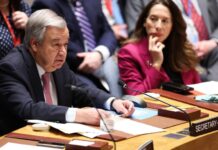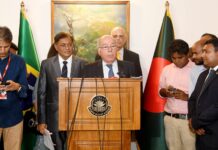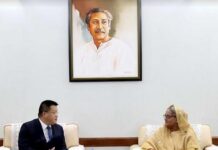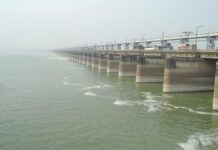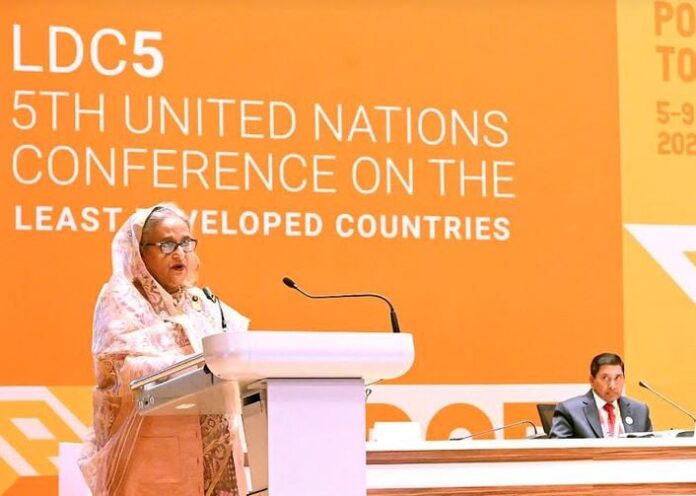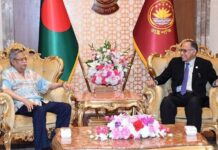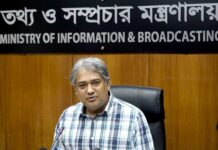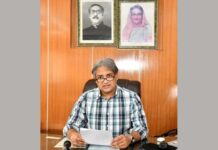Prime Minister Sheikh Hasina today said the global partnership must carry a meaning to the Least Developed Countries (LDCs) like Bangladesh so no challenge could upset their progress to attain developing countries status.
“We, the graduating LDCs, want to make sure that no challenges can further slow down our graduation momentum,” she told a conference titled “Sustainable and Smooth Transition for the Graduating Cohort of 2021”.
The premier said the graduating countries like Bangladesh were making all possible efforts to mitigate such challenges by developing their domestic capacity and enhancing competitiveness.
Bangladesh jointly organised the event with Lao PDR and Nepal held at Qatar National Convention Centre (QNCC) on the sidelines of 5th United Nations Conference on LDCs (LDC5: From Potential to Prosperity).
Sheikh Hasina said, “We are focusing on increasing our productive capacity, accelerating structural transformation, developing human capital, boosting the private sector, investing in institution building, digitalising utility services, and ensuring equity for our growth dividends. We hope to do our part as in the Doha Programme of Action”.
She added: “However, for our success, there is no alternative to a meaningful global partnership, as she placed five priorities in this regard.
First, she said WTO members should give due consideration to the submissions made by the LDC group for continuing critical international support measures for graduating LDCs.
Secondly, the global business community should come forward with more FDI and appropriate technologies in graduating LDCs, she said.
Thirdly, the international financial institutions can help translate ideas for innovative financing mechanisms to avoid sudden rise in cost of borrowing, the premier added.
As fourth priority, she said climate finance needs to be made available in flexible terms for graduating LDC cohort and fifthly, constructive cooperation is required with destination countries to bring down migration and remittance costs.
Sheikh Hasina said Bangladesh’s graduation is the result of its government’s concerted efforts over the last 14 years.
“We assumed office in 2009 based on our election manifesto – ‘Vision 2021’. We made a pledge to become a middle-income country in a ‘Digital Bangladesh’. We devised short, medium and long-term plans for each sector to reach that goal,” she said.
She added that the GDP size of Bangladesh now stands at US$ 460 billion while it was only US$ 60 billion in 2005-06.
She continued that Bangladesh is now the 35th largest economy in the world in terms of GDP and its per capita income rose to US$ 2,824 in 2022 from US$ 543 in 2006.
The premier said Bangladesh’s GDP grew steadily over the past decade at an average rate of more than 6.5 percent. Just before the Covid-19 pandemic, the GDP growth rate was 8.15 percent and even during the pandemic, its economy expanded by 6.94 percent in 2020-21, she added.
She mentioned that the poverty rate reduced to 20 percent from 31.5 percent just in a decade, infant mortality rate has now declined to 21 per thousand live births as well as average life expectancy has increased to 73 years and the literacy rate to 75.2 percent.
The head of government said, “Like other countries, our economy was badly affected by the pandemic. However, we managed to take timely and pragmatic steps to contain the spread of the disease and ensure people’s livelihoods.”
In this regard, she said the government provided financial incentives worth around US$ 20 billion under 28 stimulus packages. Near about 73.2 million people and 213,500 enterprizes were directly benefited, she also said.
The prime minister said that the government has brought poor, disadvantaged and marginalized people under extended social safety net programmes.
More than 10.7 million vulnerable people are currently receiving benefits under the programmes, she said, adding essential food items are being sold at subsidized prices among families with limited income.
She said, “Our government pursues an inclusive development pathway where no one will be left behind.”
Building on its track record with MDGs, she said the government has drawn up detailed strategies for implementing SDGs.
“We have taken initiative for localizing SDGs through stakeholder engagement at the grassroots,” she added.
Sheikh Hasina said the government is also focusing on improving physical infrastructure of the country and last year, the iconic Padma Multi-Purpose Bridge built with country’s own resources was opened.
“This bridge has established direct links between one-third of the country and our capital, Dhaka. It would also enhance regional connectivity and facilitate local and international trade,” she said.
She also mentioned that Bangladesh has entered the metro-rail era in December last and said many more mega projects like Bangabandhu Sheikh Mujibur Rahman Tunnel under the river Karnaphuli, Rooppur Nuclear Power Plant, Matarbari Multi-Purpose Project are at an advanced stage of implementation.
The premier said, “As a climate vulnerable country, we attach high priority to building climate resilient infrastructures and enhancing capacity for climate adaptation.”
During Bangladesh’s Presidency of the CVF, she recalled, “We launched the ‘Mujib Climate Prosperity Plan’. This groundbreaking plan envisions a move towards clean energy transition, climate-smart economy and green job opportunities.”
Sheikh Hasina said Bangladesh has received final recommendation for LDC graduation from the UN with a five-year preparatory period.
She said, “We’ve taken concrete plans to take our nation forward to the next levels of development. Our near-term target is to become an upper middle-income country by 2031 through LDC graduation and SDG implementation.”
She mentioned that the next vision of the government is to make the country a developed, knowledge-based and SMART Bangladesh by 2041.
She added: “We have formulated the Bangladesh Delta Plan-2100 to develop a resilient and thriving delta for our future generations. The first step towards realizing our vision is smooth and sustainable graduation.”
Sheikh Hasina, however, said Bangladesh is dealing with a number of impeding factors like the presence of 1.2 million forcibly displaced Rohingyas from Myanmar; the pandemic and other public health hazards; the climate crisis and increased natural disasters; and also impacts of the Russia-Ukraine war and subsequent sanctions and counter-sanctions.
Deputy Prime Minister of Nepal Narayan Kaji Shrestha and Deputy Prime Minister of Lao PDR Saleumxay Kommasith also spoke at the event.


